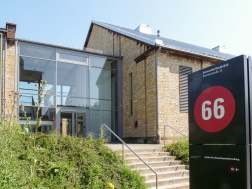Main content
Top content
20. January 2023 : Prof. Charles Palmer at the 29th Systems Science Colloquium
Professor Charles Palmer of the London School of Economics, Department of Geography and Environment presented his research at the 29th Systems Science Colloquium at the Institute of Environmental Systems Research on January 25, 2023.
The title of his presentation was "Forest co-management, food security and poverty traps".
More information on his research https://www.lse.ac.uk/geography-and-environment/people/academic-staff/charles-palmer
In his abstract, Professor Charles Palmer describes the topic of his presentation as follows:
Implemented globally since the 1990s, co-management involves the devolution and transfer of common-pool resource rights from governments to rural communities. In practice, this process often involves efforts, instigated by governments and other stakeholders, to improve livelihoods and reduce poverty via the sustainable use and conservation of resources. Quantitative empirical evidence to date suggests mixed effects with respect to forest co-management’s impacts on poverty and conservation, including in Sub-Saharan Africa. With a focus on Malawi, our study aims to fill two gaps in the literature. First, to better understand the mechanisms by which co-management influences poverty and to provide empirical evidence of potential mechanisms. Second, to investigate the distributional implications of co-management and within this context, examine whether the scheme triggered or sustained geographically-determined poverty traps. Similar to other countries with high forest cover and livelihoods dependent on resource extraction, Malawi began the process of implementing forest co-management in the 1990s. This process culminated with the Improved Forest Management for Sustainable Livelihoods Programme (IFMSLP). The IFMSLP aimed to increase household incomes and improve food security through sustainable forest management. To infer causality between the IFMSLP and its stated goals, we first apply a differences-in-differences framework to a panel dataset and evaluate the policy’s impacts on households two and five years after the end of the IFMSLP. Within this framework, we then explore the programme’s heterogeneous effects, the mechanisms by which these effects materialized, and the relationship between the programme and potential poverty traps. Finally, a discussion of the latter is extended to consider the policy’s impacts on Malawi’s forests.


